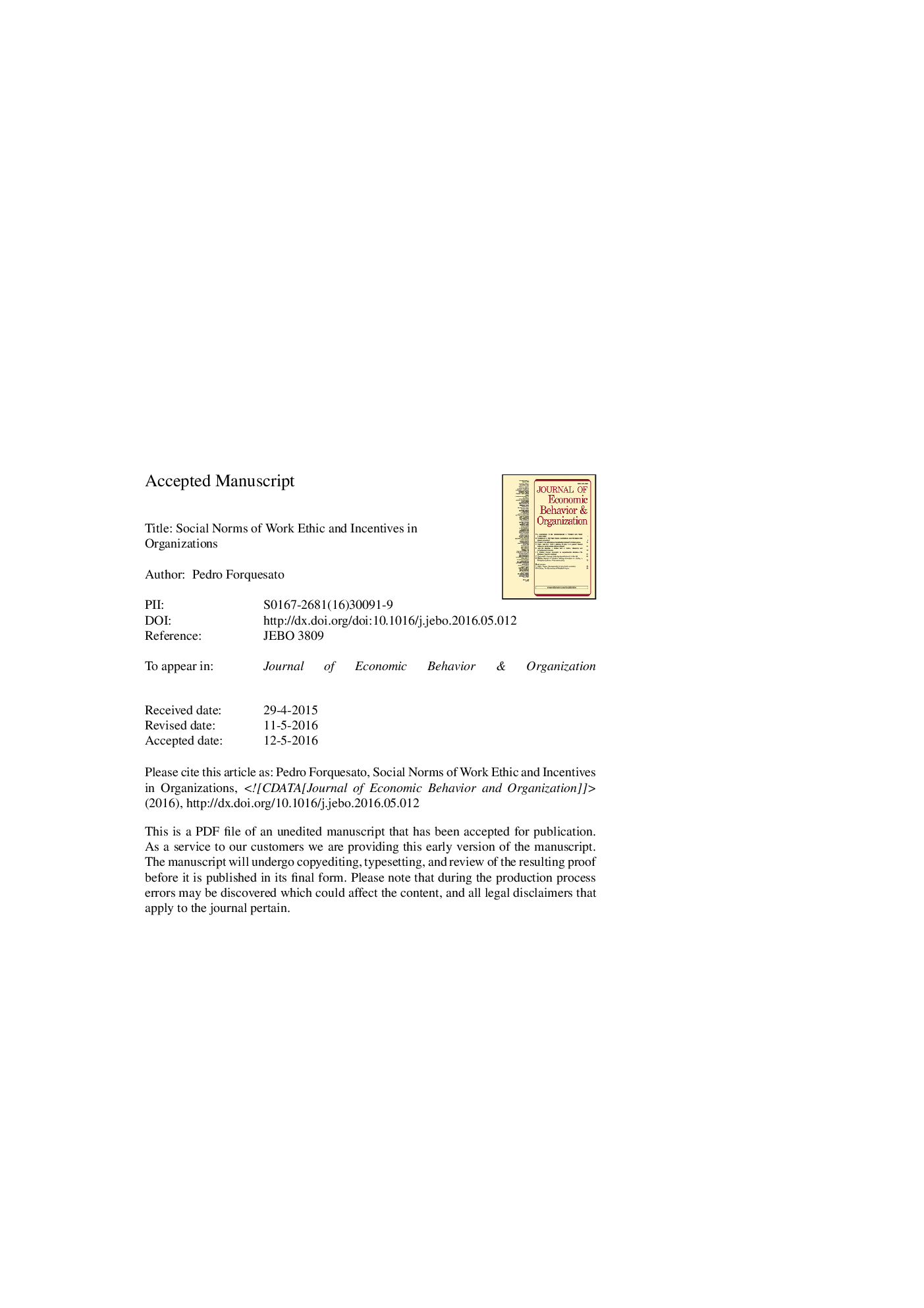| کد مقاله | کد نشریه | سال انتشار | مقاله انگلیسی | نسخه تمام متن |
|---|---|---|---|---|
| 7242800 | 1471637 | 2016 | 37 صفحه PDF | دانلود رایگان |
عنوان انگلیسی مقاله ISI
Social norms of work ethic and incentives in organizations
ترجمه فارسی عنوان
هنجارهای اجتماعی اخلاق کار و مشوق ها در سازمان ها
دانلود مقاله + سفارش ترجمه
دانلود مقاله ISI انگلیسی
رایگان برای ایرانیان
کلمات کلیدی
ترجمه چکیده
در این مقاله من رابطه بین انتشار هنجارهای اجتماعی تلاش کار (اخلاق کار) در یک جامعه خاص و انتخاب انگیزه های شرکت ها را مدل می کنم و من آن را با ارائه مدارک از سه مجموعه داده های مختلف که نشان می دهد که اخلاق کار همبستگی با شدت انگیزه های شرکت ها. زمانی که تلاش های متفاوتی از عوامل مختلف در یک شرکت مکمل هستند، کارکنان کار سخت کار باعث می شوند که یک عامل مولد تر باشد. بنابراین، در تعادل، او سخت تر کار خواهد کرد. پیش بینی می شود که یک اخلاق کاری برای کارگران سخت کارآمد باشد، والدین بیشتر مایل به انتقال آن به جوامعی خواهند بود که احتمال این که فرزندانشان همکاران خود را با اخلاق کار قوی تر بالا ببرند. سپس مدل را برای گنجاندن انتخاب فن آوری شرکت، به شرکت ها اجازه می دهم بین فرایندهای تولید مکمل و جداگانه تصمیم بگیرند. در جوامع با انتشار گسترده اخلاق کار، شرکت ها تلاش می کنند مکمل یکدیگر باشند (همانطور که در فرآیندهای تولید مدرن)، در حالی که خلاف اخلاق کار محدود است. در نهایت من دینامیک تطبیقی مدل را بررسی می کنم.
موضوعات مرتبط
علوم انسانی و اجتماعی
اقتصاد، اقتصادسنجی و امور مالی
اقتصاد و اقتصادسنجی
چکیده انگلیسی
In this paper, I model the relation between the dissemination of social norms of work effort (work ethic) in a given society and the choice of incentives by firms, and I motivate it by presenting evidence from three different datasets that suggests that work ethic is correlated with the intensity of firms' incentives. When the effort choices of different agents in a firm are complementary, having hard-working coworkers makes an agent more productive. Therefore, in equilibrium, she will work harder. Foreseeing that a work ethic is more useful to hard-working agents, parents will be more willing to transmit it in societies in which the probability that their offspring will have coworkers with strong work ethic is higher. I then expand the model to incorporate the firm technology choice, allowing firms to decide between complementary and separable production processes. In societies with wide dissemination of work ethic, firms will want effort to be complementary (as in modern production processes), while the opposite is true when the dissemination of work ethic is narrow. Finally, I investigate the comparative dynamics of the model.
ناشر
Database: Elsevier - ScienceDirect (ساینس دایرکت)
Journal: Journal of Economic Behavior & Organization - Volume 128, August 2016, Pages 231-250
Journal: Journal of Economic Behavior & Organization - Volume 128, August 2016, Pages 231-250
نویسندگان
Pedro Forquesato,
